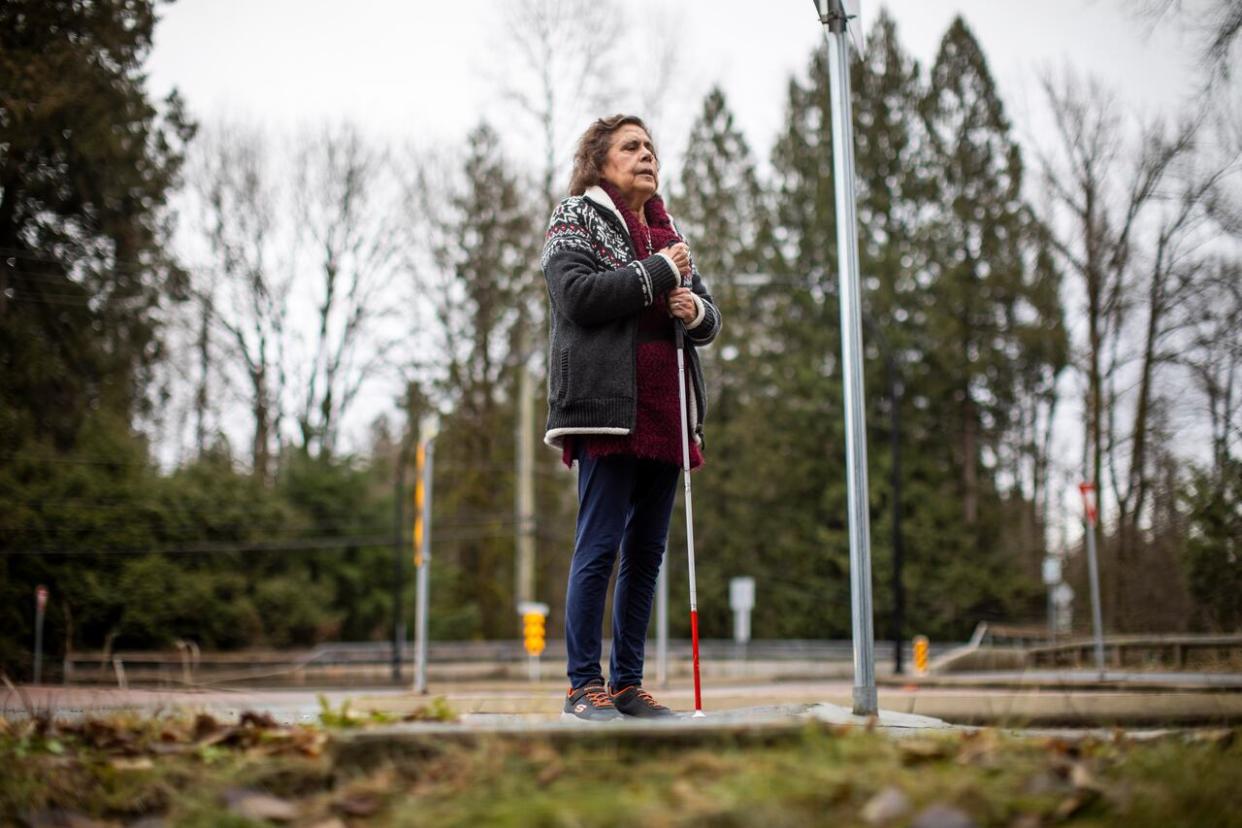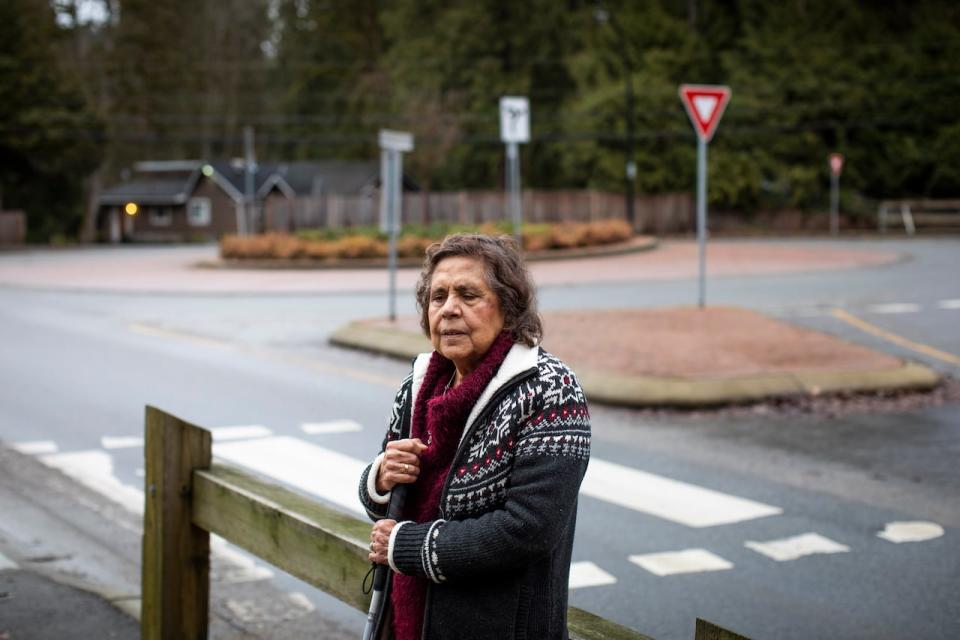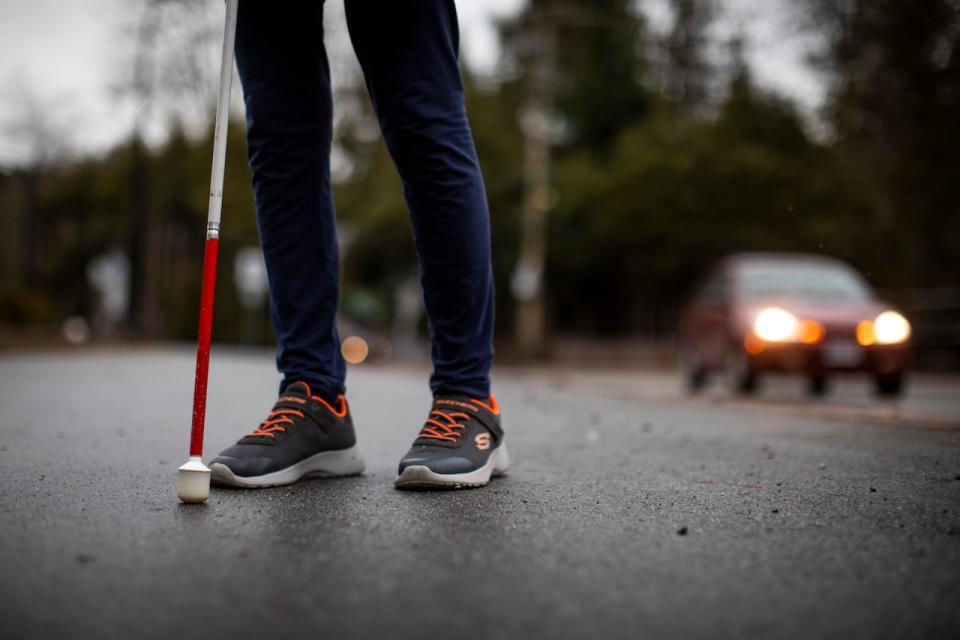Blind B.C. woman elated after city declines to appeal her human rights win

In six months, Maria Kovacs shouldn't have to worry about getting struck by a cyclist when she waits for the bus near her home in Maple Ridge, B.C.
That's the deadline for the city to make changes to an intersection and bus stop after the B.C. Human Rights Tribunal found recent infrastructure changes made them inaccessible to blind people, amounting to discrimination.
Maria Kovacs, who is blind, filed a complaint against the city on Aug. 17, 2018, alleging three areas she frequents are no longer safely accessible due to infrastructure upgrades, violating her human rights.
The tribunal ruled in her favour in regards to one of those areas and awarded her $35,000 in October. The city had the chance to appeal, but Kovacs said this week she has been informed by a lawyer representing Maple Ridge that the city will be following through with the payment and will make the ordered changes to an intersection and bus stop over the course of six months.
"They took it to almost the last day," Kovacs told CBC News, referring to the end of a two-month window the city had to seek a judicial review of the decision. "Now the fight is over, now it's the fixing."
"I feel very good, very confident, very happy," she added.
Kovacs was particularly concerned about a bike lane that merges with the sidewalk by a bus stop near her church, bank, and grocery store at Dewdney Trunk Road and 203 Street. She said the lack of any physical markers makes it impossible to know if she's walking into the bike lane, putting her at risk. She told CBC News she was even struck by a cyclist.
"There's no safe space to stand and wait for the bus there, without, for example, my [service] dog with her head in front of the road or her tail on a bike lane," she said. "We have a very small space."

Maria Kovacs, who is blind, is pictured at an intersection in Maple Ridge, B.C. (Ben Nelms/CBC)
In a statement, the city said it took time to review the order and it will make the necessary changes in consultation with a mobility specialist.
"The City of Maple Ridge is committed to building infrastructure that serves the needs of the widest range of people of all ages and abilities while balancing complex and competing interests, technical issues, and financial capacity," wrote spokesperson Fred Armstrong.
The tribunal found there were no human rights violations at the two other sites Kovacs cited as having accessibility barriers.
Crosswalk and bus stop
On Oct, 13, the tribunal ruled in favour of Kovacs on her complaint about modifications to the intersection and bus stop. Tribunal member Jessica Derynck wrote the "city has failed to establish that it could not have reasonably accommodated her without undue hardship."
In the decision, Derynck notes that Kovacs used to be able to cross the intersection of Dewdney Trunk Road and 203 Street because the pedestrian crossings met at right angles, or were relatively "square." However, the alignment changed following the installation of bike lanes and became more difficult for her to manage.
The decision found the truncated dome mats — the yellow bumpy mats at intersections meant to aid those who are blind or partially sighted — are "angled towards the centre of the intersection instead of directly towards a mat on the other side of the crossing," meaning Kovacs could not take a directional cue from it.
"There is no information that is perceptible to Ms. Kovacs about where she should cross, or at what angle, to use the pedestrian crossings," wrote Derynck.
The city has been ordered to install more truncated dome mats at the intersection, and put in raised parallel bars to provide alignment information for blind or partially-sighted people.
The tribunal also addressed the bus stop where a recently installed bike lane merges with the sidewalk. Kovacs says she was once struck by a cyclist and has since decided not to use the stop by herself.
"I find that the reconstruction of this area as a mixed-use space did create a barrier to Ms. Kovacs's use of the bus stop," Derynck wrote.
The city has been ordered to install a physical feature — a small shelter, bench, or tactile surface embedded in the ground — near the bus stop that is detectable to Kovacs to serve as a refuge area.

Maria Kovacs who is blind is pictured at a roundabout intersection in Maple Ridge, British Columbia on Thursday January 5, 2023. (Ben Nelms/CBC)
Kovacs said she hopes the bike lanes will be moved a block over away from the bus stop.
"I'm in favour of bikes, I'm in favour of walking, but right now I'm losing all the space around me to to walk on a sidewalk," she said.

